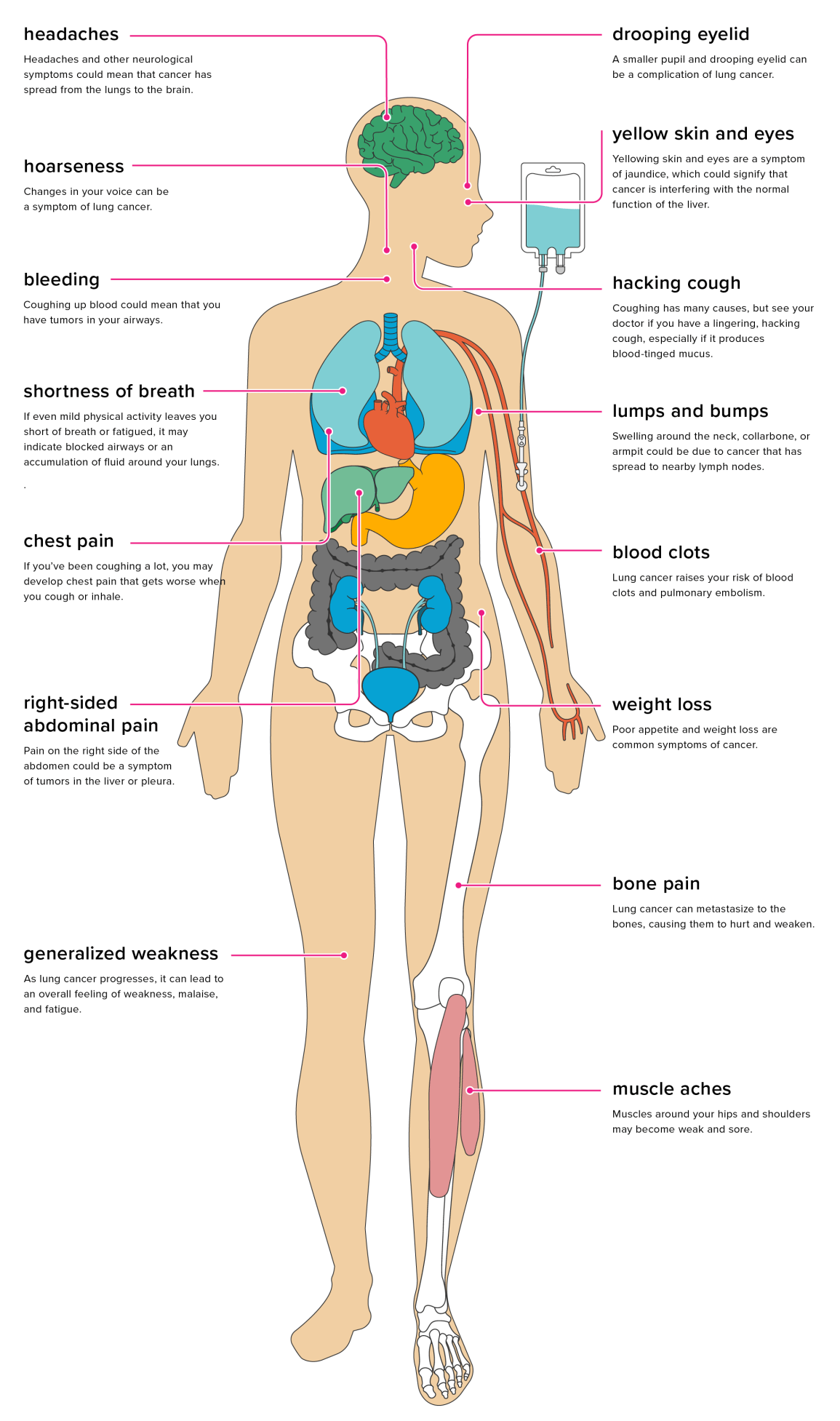Lung cancer is cancer that begins in the cells of the lungs. It’s not the same as cancer that starts elsewhere and spreads to the lungs. Initially, the main symptoms involve the respiratory system. In the later stages of lung cancer, especially if it spreads to distant areas, it can affect many systems in your body.
Lung cancer can affect more than just your lungs. Once you have a tumor in your lung, cancer cells can break off and form new tumors nearby or if wayward cancer cells enter the lymphatic system or bloodstream, they can travel to other parts of the body. This process is called metastasis. Lung cancer tends to spread to the:
- lymph nodes
- bones
- brain
- liver
- adrenal glands
Initially, it affects only the lungs and respiratory system. Other symptoms vary depending on where the cancer migrates.
Respiratory system
As cancerous cells in the lung divide and multiply, they form a tumor. Over time, new tumors can grow nearby within the lungs or in the membranes around the lungs. The membranes around the lungs are called pleura. It can also spread into the airways and the chest wall.
It’s not unusual to not have any symptoms in the early stages of lung cancer. In the early stages, lung cancer isn’t easily seen on chest X-ray.
At first, you may notice a few respiratory symptoms. Frequent bouts of bronchitis or pneumonia can be a sign of lung cancer. You may sound hoarse or notice other changes in your voice.
You may develop a persistent or recurring cough. Intense coughing can produce mucus. As the disease progresses, mucus can change color or have blood in it. A severe, hacking cough can lead to throat and chest pain. Chest pain may worsen when you breathe or cough.
A common symptom of advanced lung cancer is shortness of breath. You might wheeze or hear other noises when you breathe. As cancerous tumors start to block your airways, breathing becomes more difficult.
Fluid can accumulate around the lungs. When that happens, your lungs can’t fully expand when you breathe in. Even mild physical activity can be a strain on your breathing.
Circulatory and cardiovascular systems
Cancerous cells from the lungs can make their way into the bloodstream. The circulatory system is one way that cancer spreads from the lungs to other organs.
If you’re coughing up blood, it may be that tumors in your airway are bleeding. If bleeding is severe, treatments to control it are available. Treatments may include palliative radiation or bronchial artery embolization. In bronchial artery embolization, your doctor uses a catheter to localize and block off a bleeding artery.
If you have lung cancer, you’re at an increased risk for blood clots. A blood clot that travels to the lung is called a pulmonary embolism. It’s a potentially life-threatening event.
Learn more: Pulmonary embolism »
It doesn’t happen often, but lung cancer can spread to the heart or the pericardial sac. The pericardial sac is the tissue that surrounds the heart. Cancer treatment, such as radiation therapy can be toxic to the cells of the heart. Damage to the heart may be immediately apparent, but it sometimes takes years to detect.
Immune and excretory systems
Cancer can metastasize from the lungs by entering nearby lymph nodes. Once in the lymphatic system the cells can reach other organs and form new tumors.
Lumps and bumps around your collarbone, neck, or armpits may be due to cancer in the lymph nodes. You might also notice neck or facial swelling.
Some types of lung cancer cause substances similar to hormones to enter the bloodstream. This can also lead to problems with other organs. These are called “paraneoplastic syndromes.”
One of the common sites for lung cancer to spread is the liver, which can cause jaundice. Symptoms of jaundice include yellowing of the skin and the whites of your eyes. Another symptom of cancer in the liver is pain on your right side. Feeling sick after eating rich food is another symptom. Your doctor can use blood tests to find out more about your liver health.
Central nervous system
You may develop headaches and other neurological symptoms if cancer spreads to the brain. A brain tumor can cause:
- memory problems
- visual changes
- dizziness
- seizures
- numbness of the limbs
- weakness of the limbs
- an unsteady gait
- balance problems
When tumors form in the upper part of your lungs, they’re called Pancoast tumors. They can lead to Horner’s syndrome. Horner’s syndrome affects nerves in the face and eyes. The symptoms of Horner’s syndrome include drooping of one eyelid, one pupil that’s smaller than the other one, and a lack of perspiration on that side of the face. It can also cause pain in the shoulder.
Skeletal and muscular systems
Cancer that spreads to the bones can lead to bone and muscle pain, weakened bones, and an increased risk of fracture. Imaging tests such as X-rays or bone scans can help your doctor detect cancer in the bones.
Certain types of lung cancer are associated with the development of Lambert-Eaton syndrome, which is an autoimmune disorder. Lambert-Eaton syndrome interrupts the signals from the nerves to the muscles and can cause muscle weakness, which can affect:
- mobility
- swallowing
- chewing
- talking
Other systems
Other common symptoms of cancer include:
- unexplained weight loss
- a lack of appetite
- general weakness
- fatigue
Lung cancer often spreads to the adrenal glands, but it doesn’t always cause symptoms. Hormone fluctuations can make you feel weak and dizzy and may contribute to weight loss. Your doctor can use imaging tests to look for cancer in the adrenal glands.
